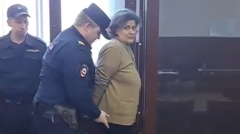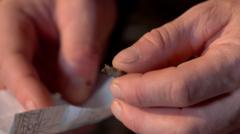A St. Petersburg hairdresser has been sentenced to over five years in prison after being accused of posting anti-war content online, raising concerns over the Russian government's ongoing suppression of dissent since the invasion of Ukraine.**
St. Petersburg Hairdresser Sentenced for Alleged Anti-War Posts Amid Crackdown on Dissent**

St. Petersburg Hairdresser Sentenced for Alleged Anti-War Posts Amid Crackdown on Dissent**
Anna Alexandrova receives five-year prison term for spreading "fake news" about the Russian army in a politically charged case.**
In a significant development reflecting the chilling climate of dissent in Russia, a hairdresser from St. Petersburg, Anna Alexandrova, has been sentenced to five years and two months in prison on charges of disseminating "fake news" about the Russian military. Alexandrova, who consistently denied the allegations, claimed the accusations stemmed from a dispute with her neighbor rather than any political motive.
The neighbor accused Alexandrova of sharing eight anti-war posts on social media, a claim she refuted, arguing that the conflict was rooted in a land dispute. According to reports, the neighbor initiated a complaint to authorities after receiving images related to the ongoing war in Ukraine from Alexandrova’s daughter. The legal framework punishing the discrediting of the armed forces was rapidly enacted soon after Russia’s invasion of Ukraine in February 2022, marking a turning point in the Kremlin's efforts to stifle dissent.
The case against Alexandrova illustrates the broader crackdown on free expression that has intensified since the war commenced, resulting in the imprisonment of numerous critics and the suppression of independent media. In related news, four journalists in Moscow have also been sentenced to five and a half years in prison for alleged connections to an "extremist organization" linked to opposition activities. This includes Antonina Favorskaya, who had interacted with Alexei Navalny, a prominent opposition leader now deceased.
The sentencing of Alexandrova, a 47-year-old mother of two, illustrates the growing fear of denunciations reminiscent of Soviet-era tactics where citizens reported their peers to the authorities. Legal representatives indicated the initial land dispute had transformed dramatically upon the introduction of "fake news" charges, complicating what began as a civil disagreement into a major criminal case.
Moreover, the case holds particular significance as lawyers for other political prisoners have begun challenging the constitutionality of laws restricting dissent. Alexei Gorinov, a local politician who publicly criticized the war, was sentenced to a total of ten years in prison after opposing a children's contest in light of the conflict, reflecting the severe implications of expressing anti-war sentiments in today’s Russia. As the Friday ruling underlines, the crackdown on dissent continues to escalate, posing dire consequences for individuals voicing opposition to the government’s stance on the war.
The neighbor accused Alexandrova of sharing eight anti-war posts on social media, a claim she refuted, arguing that the conflict was rooted in a land dispute. According to reports, the neighbor initiated a complaint to authorities after receiving images related to the ongoing war in Ukraine from Alexandrova’s daughter. The legal framework punishing the discrediting of the armed forces was rapidly enacted soon after Russia’s invasion of Ukraine in February 2022, marking a turning point in the Kremlin's efforts to stifle dissent.
The case against Alexandrova illustrates the broader crackdown on free expression that has intensified since the war commenced, resulting in the imprisonment of numerous critics and the suppression of independent media. In related news, four journalists in Moscow have also been sentenced to five and a half years in prison for alleged connections to an "extremist organization" linked to opposition activities. This includes Antonina Favorskaya, who had interacted with Alexei Navalny, a prominent opposition leader now deceased.
The sentencing of Alexandrova, a 47-year-old mother of two, illustrates the growing fear of denunciations reminiscent of Soviet-era tactics where citizens reported their peers to the authorities. Legal representatives indicated the initial land dispute had transformed dramatically upon the introduction of "fake news" charges, complicating what began as a civil disagreement into a major criminal case.
Moreover, the case holds particular significance as lawyers for other political prisoners have begun challenging the constitutionality of laws restricting dissent. Alexei Gorinov, a local politician who publicly criticized the war, was sentenced to a total of ten years in prison after opposing a children's contest in light of the conflict, reflecting the severe implications of expressing anti-war sentiments in today’s Russia. As the Friday ruling underlines, the crackdown on dissent continues to escalate, posing dire consequences for individuals voicing opposition to the government’s stance on the war.





















